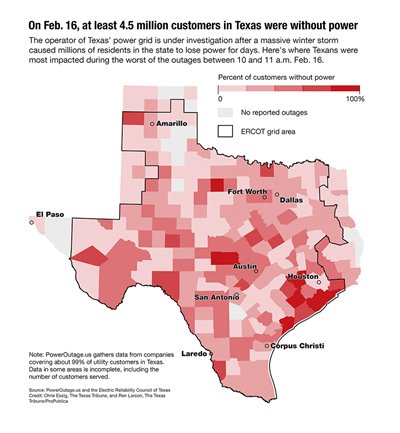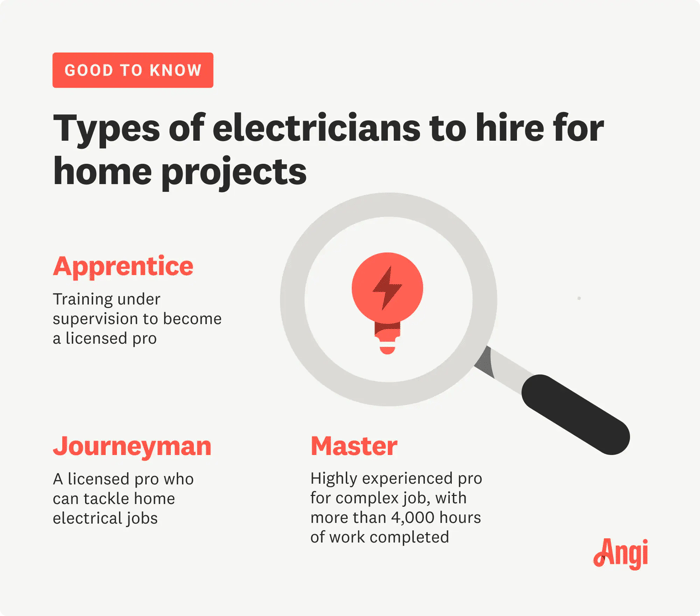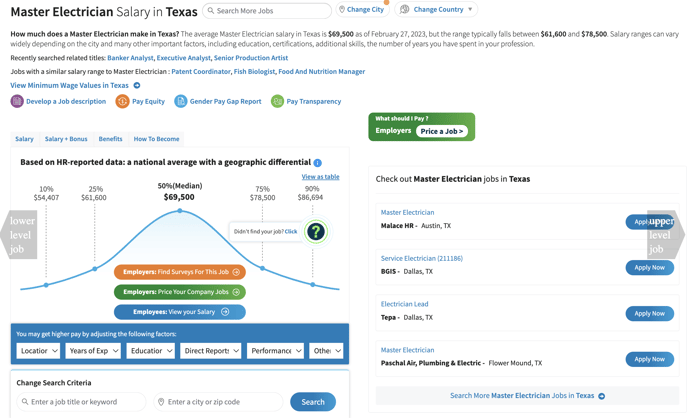How To Become an Electrician in Texas: A Step-by-Step Guide
This guide is a must-read for anyone interested in becoming a Texas electrician. Here’s how to become an electrician in Texas, salary information, and more.

Texas is booming! With large corporations like Apple, Dell, and Tesla adding employees and small businesses creating jobs across the Lone Star state, demand for professional services has never been greater.
Chief among these needs? Electricians. Every time a new home is built in Fort Worth, a new skyscraper goes up in Austin, or new condos are constructed in Houston the need for electricians in Texas grows.
From Abilene to Zapata, electricians are in demand and it can be a lucrative career. Compared to other states, when it comes to salary for electricians, Texas ranks seventh in the nation.
Does Your Business Need a Website?
Discover the Benefits and Get Started Today!
Jump to:
-
Being an Electrician in Texas
-
Commercial Versus Residential Electrical Work: What’s the Difference?
-
Follow These Steps To Become an Electrician in Texas
-
Apprenticeship vs Trade School: What's Better and What's Required?
-
Taking an Electrical Job Versus Launching Your Own Business
-
Here To Help You Run Your Electrician Business
Being an Electrician in Texas
Because of Texas’s high and sustained temperatures in the summer months, most of the businesses and residences in the state consume a significant amount of electricity during that time. As with all things mechanical, greater use leads to an increased number of problems, breakdowns, and outright replacements.

Source: The American Society of Mechanical Engineers
Layer in that the last three winters have seen significant statewide strain on the powergrid in February due to harsh cold and business is booming for Texas electricians.
While harsh winter storms are hard to forecast, Texas oppressive summer heat is unlikely to abate any time soon. This means current and future electricians in Texas should be in hight demand for a long time.
If you are interested in becoming an electrician, here is a step-by-step guide to get you started on your journey:
Types of Electricians
There are several different types of electricians and each specializes in a certain area.
- Journeyman electricians are licensed to install, maintain, and repair electrical systems and equipment.
- Master electricians have advanced training and experience in low-voltage, high-voltage, and fiber optics systems.
- Residential electricians install and repair wiring for homes and buildings.
- Industrial electricians work in industrial settings, while commercial electricians specialize in larger-scale projects such as office spaces or malls.

Source: Angi
The Pros and Benefits of the Profession
There are a lot of benefits that come with a career as an electrician. One of the biggest pros is that, due to a high demand for this trade, electricians typically earn a solid salary. Additionally, benefits like health insurance and retirement plans are generally part of the compensation packages.
With some companies, you may get to travel. The job itself can also be quite rewarding as you’ll get to work with your hands and (hopefully) make people’s lives a bit easier.
The only real downside is that you may find yourself working long hours during peak periods and if you do travel, you may spend extended periods away from home/family.
Electricians also have to stay up-to-date on changing codes and regulations that are associated with their trade.
Lastly, electricians must take the necessary safety precautions to protect themselves and their clients. Ongoing training is a must to stay apprised of new products, services, and regulations.
Salary and Future Job Outlook
According to Salary.com, as of February 2023, journeyman electricians in Texas make between $56,900 and $73,600, or an average of $65,000. Pay can vary widely depending on the city and many other important factors, including experience, education, certifications, and any additional skills
The image above is a screenshot from Salary.com. Click the image to go to the page and change the inputs.
Commercial Versus Residential Electrical Work: What’s the Difference?
As the names imply, residential electricians perform their work in homes while commercial electricians work on bigger projects like office buildings or malls. Both types of electricians need to have special certifications to be able to work.
Certifications required for a residential electrician include state licensure, specialized certification in electrical systems and wiring, as well as knowledge of safety codes. Commercial electricians are required to have a master electrician license, specialized certification in electrical systems and wiring, as well as a complete understanding of safety codes.
Commercial electricians can find job opportunities in many different industries like construction, manufacturing, engineering, utilities, telecommunications, and more. Residential electricians have less opportunities as they're limited to homes and residences.
Follow These Steps To Become an Electrician in Texas
First off, no matter where you live you need to research your options and make sure that this career path is right for you before jumping into it. Once you’re sure this is what you want, you'll need to complete the following steps:
1. Apply for an Apprentice License
In Texas, before you can even begin training as an electrician, you must have an Apprentice License from the State Board of Electricians. This will license you to be able to work under the direct supervision of a licensed electrician where you'll learn everything from basic electrical theory to safety protocols.
2. Apply to an Electrician Apprenticeship Program
The next step is to apply to an electrician apprenticeship program in your area. Apprenticeships are typically two years long and provide classroom instruction as well as hands-on training from a master electrician or journeyman electrician.
3. Complete the Required Hours of Training
To become an electrician in Texas, you must complete classroom instruction and 8,000 hours of on-the-job training. Master electricians must complete 12,000 hours.
4. Take the Licensing Exam
Once the above requirements are completed, you can apply for a journeyman license. You'll have to pass another exam that covers additional codes and other key knowledge points. Once you pass that exam, you can officially start working as a licensed electrician in Texas.
Optional: Apply for an Electrical Contractor License
To get this type of license, you have to pass an advanced exam on business practices, project management, and electrical systems. Once licensed, you can manage and bid on larger projects and hire journeyman electricians to work on your projects.
Apprenticeship vs Trade School: What's Better and What's Required?
Depending on your individual situation and career goals, you may be torn between an electrician apprenticeship and attending a trade school. An apprenticeship is typically the most cost effective route as it allows you to train on-the-job while also gaining classroom instruction and knowledge.
Trade schools are more expensive but they provide more comprehensive training in electrical theory, wiring, and safety codes. Ultimately, the choice is up to you but both options will require completing the required hours of training in order to become a licensed electrician in Texas.
Taking an Electrical Job Versus Launching Your Own Business
As you can see, it takes a lot of time, education, and dedication to become an electrician in Texas.
Pros:
- Lucrative pay
- Extensive job opportunities in various industries
- Ability to work with your hands and engage in problem solving activities
Cons:
- Potential risks due to working with electricity
- May require long hours and dealing with difficult clients/job sites
- Requires extensive training and education
However, once you've become a licensed electrician, you don't necessarily have to work for an electrical company. While working for one gives you steady pay and job security, starting your own business has a few more pros (and cons) that you need to be aware of.
Pros:
- Ability to set your own rates and hours
- Increased earning potential through increased billable hours
- More control over the type of jobs you take on
- Opportunity to build relationships with clients
- Potential for growth by hiring additional electricians
Cons:
- Requires business acumen, as well as electrical skills in order to be successful
- Increased paperwork and administrative tasks associated with running a business
- Potentially higher overhead costs due to needing additional tools, supplies, and equipment
- Requires liability insurance coverage in case of accidents or injuries
- Must invest in marketing activities to attract and retain new clients
Whether you choose to pursue an electrician apprenticeship, attend trade school, work for a company, or start your own business, becoming an electrician in Texas can be a great career path!
Here To Help You Run Your Electrician Business
Running a business like this requires a lot of hard work and dedication but it can be extremely rewarding. To really do it right and take some of the load off of your shoulders, you need tools that can provide a wide range of services from electrician marketing strategies to managing local codes and regulations.
%20(1)%20(1).png?width=340&name=Group%2012%20(2)%20(1)%20(1).png)




